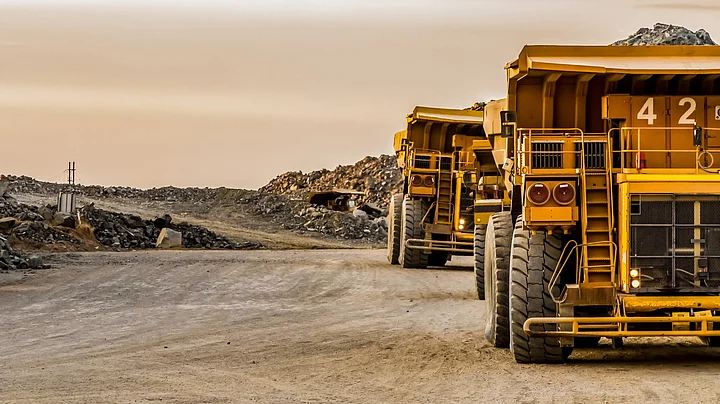In February this year, India struck 'white gold' when 5.9 million tonnes of untouched lithium deposits were discovered in the Reasi district of Jammu and Kashmir. In May 2023, media reports suggested that lithium resources were traced in Rajasthan's Degana as well.
In August 2023, the Parliament passed the Mines and Minerals (Development and Regulation) Amendment Bill, 2023, allowing the central government to auction the mines of India's newly discovered reserves of lithium, among other minerals.
Previously, lithium along with other minerals, was on a list of atomic minerals which had prevented it from being auctioned off to and mined by the private sector.
The central government said that it will now conduct a pre-bid conference on Friday, 22 December, for the first tranche of auction of 20 critical and strategic mineral blocks.
However, environmentalists fear that lithium mining may cause water and air pollution and environmental degradation.
But is lithium crucial for India? And why are experts worried about the environmental impact of lithium mining? The Quint finds out.
Which Mineral Mines Are Being Auctioned?
The mineral mines being put up for auction are:
Glauconite
Graphite
Potash
Nickel
PGE
Lithium
REE
Molybdenum
Phosphorite
These mining blocks are found in eight states and union territories, including Bihar, Chhattisgarh, Gujarat, Jharkhand, Odisha, Tamil Nadu, Uttar Pradesh, and Jammu and Kashmir.
"Upon removal of these minerals from the list of atomic minerals, exploration and mining of these minerals will be open to private sector," a government statement had read.
"As a result, exploration and mining of these minerals is expected to increase significantly in the country," it added.
Why Is Lithium Crucial for India?
Lithium-ion batteries are generally utilised in electric vehicles (EVs). According to the International Energy Agency (IEA), EVs will account for about 60 percent of new car sales by 2030.
India is primarily dependent on imports for lithium, mainly from China and Hong Kong. In 2020-21, China accounted for 73 percent of India's imports of lithium-ion.
Hence, experts said that the Centre has lifted the ban on lithium mining and allowed private players to mine the mineral in order to reduce dependency on imports.
"At present, due to the small size of the Indian EV market, Indian players lack the economies of scale to compete with Chinese players when bidding for resources," Lohum Cleantech CEO Rajat Verma was quoted as saying by Forbes.
"We believe the lifting of the mining ban can change with usage of domestic resources along with an export orientation to increase the addressable market for lithium-bearing finished products," the head of the sustainably Li-ion battery manufacturing company said.
What Are the Environmental Concerns?
Though lithium's primary use pertains to renewable energy sources such as electric cars and solar panels, the extraction methods for the mineral can be energy-intensive.
Exactly how energy-intensive is the lithium mining process?
"Some studies suggest that 2.2 million litres of water is required to extract one tonne of lithium," Saleem H Ali, professor of energy and the environment at the University of Delaware, told The Quint.
In Chile (which is the world's second-largest producer of lithium after Australia), it is estimated that 50,000 gallons of water yields 1 ton of lithium, according to the Centre for Strategic and International Studies,
Professor Ali explained that in the so-called Lithium Triangle of South America, which is made up of Bolivia, Chile, and Argentina, large quantities of water are pumped from underground sources to help extract lithium from ores.
This in turn, has been linked to the shrinking groundwater levels as well as desertification.
In fact, according to the United Nations Conference on Trade and Development, in Chile's Salar de Atacama, lithium mining and other mining activities are responsible for consumption of 65 percent of the water – leading to groundwater depletion and other forms of environmental degradation.
Will Lithium Mining Threaten the Already-Fragile Ecology?
The government has already started taking steps to facilitate mining the lithium mineral in Reasi, according to multiple reports. However, mining in such a hilly district has its own challenges.
For one, owing to its fragile ecology, the Himalayan region is extremely vulnerable. Raising environmental concerns of large-scale mining, experts warned that tampering with the environment in the hills of Jammu and Kashmir could be detrimental.
Srinagar-based activist Dr Raja Muzaffar Bhat told The Quint that the J&K region has fragile mountains due to which mining can cause environmental hazards.
"The mountains in Jammu's districts, Ramban, Reasi, Udhampur, Doda and others, have excessive sand and soil owing to which they are fragile. And mining in mountainous areas can have serious effects and may make it more fragile," he added.
He highlighted how the soil in the Ramban-Banihal stretch is sedimentary, resulting in erosion and falling debris besides common landslides, thus hampering road widening on the Srinagar-Jammu National Highway.
Muzaffar elaborated on how Reasi is already suffering from the adverse impacts of "developmental projects."
"Several villages in Reasi are struggling to access enough water, after perennial streams dried up following the construction of the Chenab Rail Bridge, the highest railway bridge, in the world. Now, if mining comes to the ore, you can imagine what will happen to the already water-stressed area," he added.
